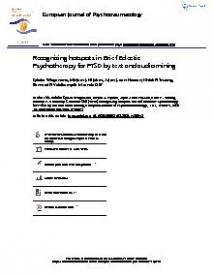Recognizing hotspots in Brief Eclectic Psychotherapy for PTSD by text and audio mining
Background: Identifying and addressing hotspots is a key element of imaginal exposure in Brief Eclectic Psychotherapy for PTSD (BEPP). Research shows that treatment effectiveness is associated with focusing on these hotspots and that hotspot frequency and characteristics may serve as indicators for treatment success.
Objective: This study aims to develop a model to automatically recognize hotspots based on text and speech features, which might be an efficient way to track patient progress and predict treatment efficacy.
Method: A multimodal supervised classification model was developed based on analog tape recordings and transcripts of imaginal exposure sessions of 10 successful and 10 nonsuccessful treatment completers. Data mining and machine learning techniques were used to extract and select text (e.g. words and word combinations) and speech (e.g. speech rate, pauses between words) features that distinguish between ‘hotspot’ (N = 37) and ‘nonhotspot’ (N = 45) phases during exposure sessions.
Results: The developed model resulted in a high training performance (mean F1-score of 0.76) but a low testing performance (mean F1-score = 0.52). This shows that the selected text and speech features could clearly distinguish between hotspots and non-hotspots in the current data set, but will probably not recognize hotspots from new input data very well.
Conclusions: In order to improve the recognition of new hotspots, the described methodology should be applied to a larger, higher quality (digitally recorded) data set. As such this study should be seen mainly as a proof of concept, demonstrating the possible application and contribution of automatic text and audio analysis to therapy process research in PTSD and mental health research in general.
In: European Journal of Psychotraumatology ISSN: 2000-8066 | 11 | 1
https://doi.org/10.1080/20008198.2020.1726672
1726672


